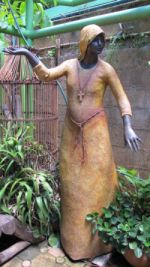A VISIT TO THE CARIBBEAN PROVINCE
“I wanted to visit an Ursuline province with a different culture, where it would give me a third-world experience,” recalled Sr. Ann Peterson. She chose the countries of the Ursuline Caribbean Province: Barbados, Venezuela, and Guyana. For her the experience of Ursuline life and mission in countries and cultures there offered her a new horizon on the common Ursuline mission. When she landed in Caracas, Venezuela, the language difference was the first of these experiences.
Ann had been elected by the Eastern Province as a delegate to the Ursuline General Chapter in Rome to be held September 10 to October 10, 2013; delegates from the provinces around the world visit another province where Ursulines serve.

A sculpture of
Saint Angela Merici
created by Elias Toro
for Academia Merici in
Caracas, Venezuela.
In Caracas under the leadership of Sister Jacqueline daSilva, the Ursulines sponsor Merici Academy for girls from pre-school through high school. The school continues the traditions of Ursuline education in its academic programs and in its Serviam spirit through the activities that turn theory into practice. The school buzzes with activity and energy, not unlike American schools.
In a bustling urban setting, students, their parents, and alumnae actively engage and give of themselves in service, particularly to the poor. Most notably, their presence and contribution to a school in the barrios that serves a poor neighborhood. The spirit of St. Angela is strong there, Ann noted, though the political climate and its effects are uncertain.
Catching a plane to Georgetown, Guyana, introduced Ann to the limited air travel among these countries, with long waits in airports. The language in Guyana is English from its colonial days. The hot, humid climate of Guyana is as characteristic as the abundance of fruit and vegetables available in the marketplaces. The Marian Academy and St. Ann’s Orphanage are the main works of the communities there. The sisters live in the convents nearby with local living conditions; water and electricity are in limited supply. Yet life flourishes as everyone adapts.

St. Ann’s Orphanage in Guyana
Girls, pre-school through high school, live in St. Ann’s. These children, unable to live with their families because of extreme poverty or abuse,are assigned to St. Ann’s and attend local schools, St. Rose’s and St. Angela’s. They are cared for in the shadow of the convent by sisters and lay staff. What is striking is the life and growth of the children of St. Ann’s, in the midst of the limitations that go with poverty and at the same time with the generosity of people who support the orphanage.
Nearby Marian Academy, a pre-school through secondary school with an Ursuline principal, provides education much like Ursuline schools elsewhere; it is heartening, Ann notes, to recognize the common spirit among the schools.
Far in the interior of the country where the roads are nearly inaccessible, the Ursuline sisters of Tildonk have a mission to the native people of Guyana.
Next stop for Ann Peterson was Barbados, an island in the Caribbean more known, on its west side for luxurious tourist destinations. In contrast, and to the south in Bridgetown, the Ursuline school is located, not far from the beautiful blue waters of the Caribbean, and near to poorer dwellings of the native inhabitants. Here, she encountered the Ursuline spirit in St. Angela’s lower school and St. Ursula’s secondary school, amid the island’s economic and social limitations. As in the other schools she had visited, she marveled at the children’s singing, joyful and hearty, especially the song “Insieme,” meaning “together,” and composed to express the theme among Ursulines worldwide.
Ann reflected on her days there, with fewer than twenty sisters in the countries of the province, that “each of the Ursuline communities in these three countries gather for communal prayer each morning and evening. The deep faith of the sisters, in the midst of obvious challenges, was one of the most impressive and moving experiences for me.”
“The political situation in each of these areas,” she went on, “has an impact on our ministries. This is especially so in Caracas, where there was a recent election.”
For an American Ursuline, the visit to the Caribbean provinces was by turns heartwarming in the common spirit she encountered, and heart-aching in its poverty and the material limitations of basics an American takes for granted. At the same time the horizons of Ursuline life and service expanded to take in the rich and enriching, hard-working, and devoted women, men, and children that are the communities of the Caribbean Province.
